- JP
- EN
Preservation of marine environments / Protection of biodiversity
- Fundamental Policy
- Initiatives
- Collaborating with Stakeholders
- Support for International Initiatives
Fundamental Policy
The MOL Group recognizes the impact of its business operations on the marine environment and ecosystems, and will proactively move ahead with measures to minimize this impact, as the marine environment is the site of our business activities and the common property of all people all over the world. We not only prevent maritime incidents by thoroughly ensuring safe operation and complying with environmental regulations, including proper management of ballast water in conjunction with cargo handling operations, but also implement voluntary efforts to mitigate negative impacts.
The MOL Group's commitment to protecting the marine environment and biodiversity is clearly stated in the "MOL Group Environmental Policy Statement." In addition, the MOL Sustainability Plan (MSP) sets a target of "Reduce negative impact on the marine environment and biodiversity," and aims to improve our efforts by formulating action plans and measuring our progress with key performance indicators (KPIs). For details, please refer to "Environmental Management" and "Sustainability Issues (Materiality)".
Initiatives
Ballast Water Management
Ballast water, which is discharged while loading cargo, carries marine organisms around the world and can have a negative impact on marine ecosystems and biodiversity. Accordingly, the International Maritime Organization (IMO) adopted the Ballast Water Management Convention in 2004. As the requirements for its ratification were satisfied in September 2016, the convention is slated to go into effect in September 2017.

MOL developed a ballast water treatment system in cooperation with manufacturers. In FY2014, we decided on a company-wide policy to install the systems prior to the treaty coming into effect, and have been proceeding with the installation. By September 2024, all vessels owned by MOL-group will have been equipped with ballast water treatment systems. Furthermore, all newly built vessels delivered after that date will be completed with these systems installed.
Control and Management of Ships' Biofouling
The transfer of invasive aquatic by ships has been identified as a major threat to biodiversity. The Guidelines for the control and management of ships' biofouling to minimize the transfer of invasive aquatic species was adopted by IMO in 2011, and discussions for a revision are currently underway. We are contributing to the discussions by expressing opinions from the perspective of practicality through industry groups.
Preservation of Marine Environments

- The double-hull structure is required for fuel tanks and tankers by international laws. The MOL group complies with the relevant treaties and laws.
- On a vessel, which is also a home for seafarers, the same type of garbage is generated as with land-based households, in addition to various waste products unique to ships such as loading and packing materials. On our operated vessels, based on the MARPOL Convention, we draw up on-board waste management plans requiring separation, collection, storage and disposal of on-board waste.
Waste management officers supervise this process, and work to build thorough awareness of the plan among officers and crew members. Food waste and other biodegradable trash are ground into small particles and disposed of in specified areas of the open sea, and plastic waste is disposed of appropriately on land. - Fuel oil for vessels contains many impurities. Water and other contaminants are extracted by pre- treatment before the fuel is used in engines and other equipment. Waste oil containing water and impurities from pre-treatment is heated in a special tank to remove water and then incinerated in conformity with environmental regulations.
- In a vessel's engine room, bilge water (waste water containing oil) is generated by leakage from seawater pipes and equipment and during maintenance work. We have introduced a bilge source separation system that categorizes bilge water in three stages according to the presence of oil, which is then collected and disposed of properly.
Reducing the negative impact of noise on marine life
It has become known through research by experts that the sound generated by ships in the water has an adverse effect on the living environment of marine organisms such as whales and dolphins. The impact of noise is currently the subject of discussions at the International Maritime Organization and other organizations. It has been confirmed in aquarium experiments that the PBCFs* help reduce underwater noise by eliminating the hub vortices. The Port of Vancouver in Canada, which is making efforts to protect the environment of its harbors, has listed PBCFs as an underwater noise reduction device in its environmental program "Eco Action Program";. The Port of Prince Rupert, Canada, has also certified the PBCFs as an underwater noise reduction technology.
* PBCF (Propeller Boss Cap Fins), an energy-saving device sold by MOL's group company, MOL Techno-Trade, Ltd.
Initiatives for ship recycling
The MOL Group is engaged in recycling activities for vessels that have reached the end of their services lives, in consideration of the marine environment and other environmental aspects. For details, please visit "Responsible Procurement".
Recycling of lashing belts/office supplies
MOL has developed its own recycling system for lashing belts, which are used to secure vehicles aboard car carriers, and since 2015, we have been consolidating our recyclables with recycling companies in Oita Prefecture and recycling them. Lashing belts are classified into plastic and metal parts; plastic parts are processed into secondary fuel and metal fittings are recycled as steel scrap. In addition, the MOL Group has established "MOL Group Basic Procurement policy" which includes promoting the procurement of environmentally friendly products. In addition to thorough green procurement and recycling of office supplies, we also use a range of internal communication tools to raise employees' awareness of environmental issues.
Water Recycling
Most of the domestic water used on board is recycled seawater. Freshwater is produced from seawater using desalination equipment installed on the vessel.
Additionally, at the headquarters of our company and on the cruise ship 'Nippon Maru,' WOTA Corporation's water recycling handwashing station 'WOSH' has been installed. 'WOSH' recycles over 98% of the water used on the spot, allowing us to wash our hands around 500 times with just 20 liters of water. It is an eco-friendly handwashing stand that reduces wastewater and is considerate of the future of our planet.
Collaborating with Stakeholders
Collection and investigation of marine microplastics and marine debris
MOL and Miura Co., Ltd. have jointly developed a microplastic (particles of 5 mm or less) collection device, which was installed on a woodchip carrier delivered in February 2022 to sail under Charter contract with Marusumi Paper Co., Ltd. Since then, the number of vessels equipped with the device has gradually expanded to a total of five vessels. Furthermore, a second-generation centrifugal-type microplastic (MP) collection device, which can collect MPs at all times while a ship is underway, has been developed in parallel, and it has now been installed on a trial basis on the MOL-operated car carrier Emerald Ace. The addition of a centrifuge allows the device to efficiently separate floating MPs from concentrated seawater that has a high density of floating debris, without closed plumbing. This enables it to treat water in the seawater line, which continually draws in seawater, and even treat the full amount of discharge water after it passes through a filter with a backwashing function in the ballast water treatment system. As a result, the system has an annual seawater treatment capacity about 70 times that of the previous device. As car carriers operate all over the world, we can contribute to the conservation of the marine environment by using this device to clean any waters where they navigate.
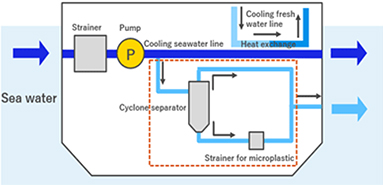
device and piping
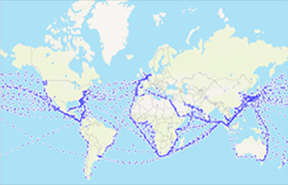
in service
In other projects, MOL proposed a survey aimed at establishing a system to collect plastic debris and other marine debris using specialized collection ships was selected for the Japan International Cooperation Agency (JICA) SMEs/SDGs business support program. In Vietnam, where the marine debris problem is becoming more serious, we are conducting a study on formulating a locally adapted marine debris collection system, with the aim of introducing the system around 2023.
Marine Biodiversity Big Data Project 'Ocean180'
MOL participates in an industry-academia-government collaborative project to conserve marine biodiversity called "Ocean180," led by Professor Yasuhiro Kubota of the Biology Program, Marine and Natural Science Dept. in the Faculty of Science at the University of the Ryukyus. This is a long-term project to protect marine biodiversity which will visualize ocean ecosystems based on big data related to marine life, statistical modeling, and artificial intelligence (AI). The name "Ocean180" reflects the wish for a reversal of deteriorating conditions in the world's oceans and a move toward improvement. The project will promote effective actions to conserve and regenerate the oceans based on big data analysis of biodiversity.
Initiatives in Mauritius
After the oil spill incident involving the chartered vessel Wakashio in 2020, MOL has been working to restore and protect the natural environment and contribute to local communities in the Republic of Mauritius. We established a local subsidiary, MOL (Mauritius) Ltd. to promote our initiatives in Mauritius. We also established the "MOL Charitable Trust" to provide direct support to the people of Mauritius, and established the authorized public trust "MOL Mauritius International Fund for Natural Environment Recovery and Sustainability" in Japan, to support larger-scale projects. We are making ongoing contributions totaling 800 million yen to the two funds. Both funds have steering committees and Committees of Enforcers consisting of eminent experts in their respective fields, supporting projects that contribute to local communities, such as the restoration and conservation of Mauritius’ rich nature and ecosystems, including mangrove forests and coral reefs, the protection and study of wild birds and migratory birds, including endemic species, and the promotion of the blue economy, such as fisheries.
This initiative is underway in collaboration with the government of Mauritius, local residents, local NGOs, and many other stakeholders.
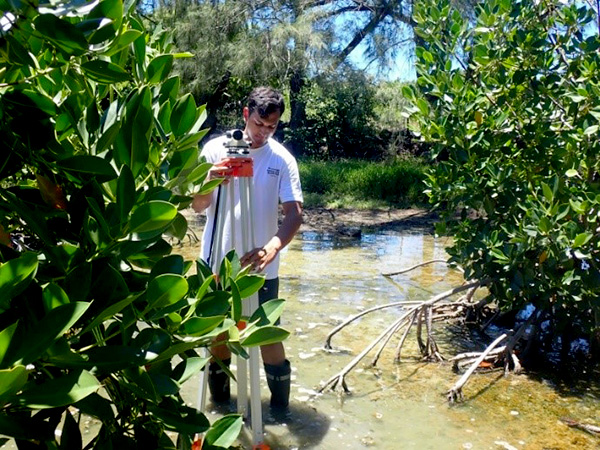
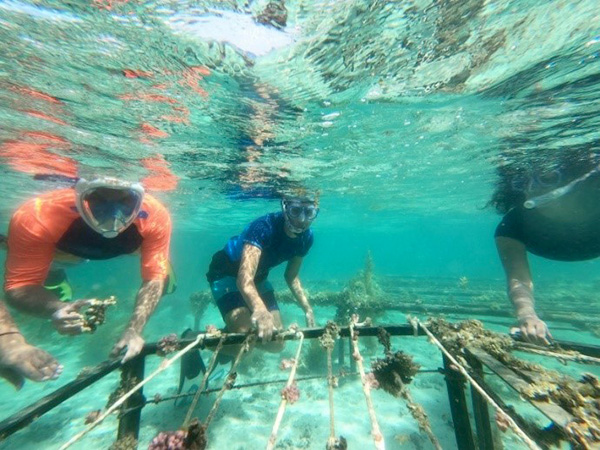
For more information about our activities in Mauritius, please visit our dedicated website "MOL for Mauritius."
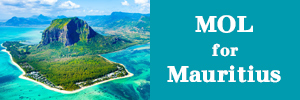
Mangrove Restoration and Conservation Project in Indonesia
MOL and YL Forest Co., Ltd. are jointly participating in the Blue Carbon Project in Indonesia, which aims to restore and conserve mangroves. Mangroves not only remove and store carbon, but they are also regarded as the "cradle of life" that protects the diversity of organisms that live with them. Through this project, we intend to contribute to the restoration and conservation of the ecosystems of wild plants, animals, fish, and shellfish living in the mangrove forests and surrounding rivers. Mangroves are also very important from the aspect of helping communities adapt to climate change, for example, providing protection from high waves that threaten shorelines and in turn affect people's livelihoods. MOL and YLF will work together on mangrove restoration and conservation activities, and adopt the "Silvofishery" to help improve the livelihoods of local residents through sustainable fishery and forest management, aiming to create a society where people live in harmony with nature.
For details, please visit "Climate Change Countermeasures".
Support for International Initiatives
The TNFD Forum
We participated in the Taskforce on Nature-related Financial Disclosures (TNFD) Forum*1 in November 2022. In January 2024, we registered as a TNFD Early Adopter*2, indicating our commitment to disclose information in accordance with the TNFD's disclosure recommendations.
*1 TNFD is an international initiative to develop and deliver a risk management and disclosure framework for organizations to report and act on evolving nature-related risks, with the ultimate aim of supporting a shift in global financial flows away from nature-negative outcomes and toward nature-positive outcomes. The TNFD Forum includes various stakeholders, including corporates, financial institutions, and academic and research organizations, with the aim of supporting discussions and framework building at TNFD.
*2 'TNFD Adopter' refers to a company or organization that has registered on the TNFD website their intention to disclose information in accordance with the TNFD recommendations. 'TNFD Early Adopter' refers to company or organization that will disclose nature-related information for either the 2024 or 2025 fiscal year in accordance with the TNFD recommendations.
30by30 Alliance for Biodiversity

MOL and an MOL's group company, Daibiru Corporation joined the "30by30 Alliance for Biodiversity", established by 17 industry, private, and government organizations including the Ministry of the Environment.
The Daibiru Group is engaged in creating environmentally friendly towns full of greenery in order to contribute to sustainable development of society. To coexist with the natural environment, the Company has actively worked to protect the environment by creating eco-friendly green zones on building premises, including the Shin-Daibiru Building Dojima-no-mori.
International Society for Mangrove Ecosystems (ISME)
MOL is an institutional member of the International Society for Mangrove Ecosystems (ISME), which works to restore and conserve mangrove forests around the world, and actively supports the organization’s efforts.
'Plastic Smart' Forum

MOL participates in "Plastic Smart" initiatives which hosted by Ministry of the Environment of Japan to address the issue of the marine plastic waste problem as an action to protect the marine environment.
Marine plastic waste, which is generated in bulk on a daily basis all over the world, remains in the ocean for a long period of time and is regarded as a global-scale environmental pollution issue.
The "Plastic Smart" initiative is a platform among the companies and organizations that are interested in reducing marine plastic waste.
- Sustainability TOP
- Message from the Chief Sustainability Officer
- Sustainability
Management - Value Creation
Stories - Safety & Value
- Environment
- Human & Community
- Innovation
- Governance
- Stakeholder
Engagement - Sustainable Finance
- Sustainability Data
- ESG Disclosure
Guideline Indexes - External Recognition
- Library



